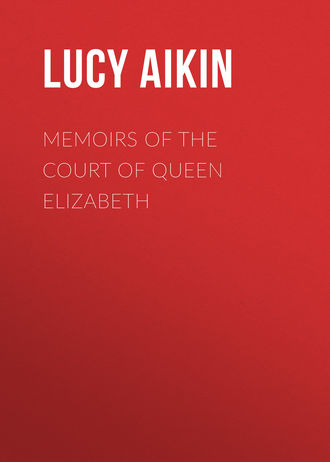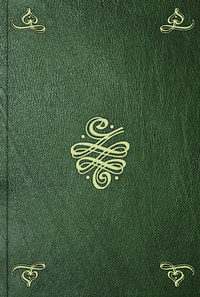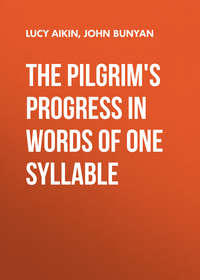 полная версия
полная версияMemoirs of the Court of Queen Elizabeth
An author of the present day, whose elegant taste and whose profound acquaintance with the writers of this and the following reign entitle him to be heard with deference, has favored us with his opinion of Euphues in these words. "This production is a tissue of antithesis and alliteration, and therefore justly entitled to the appellation of affected; but we cannot with Berkenhout consider it as a most contemptible piece of nonsense90. The moral is uniformly good; the vices and follies of the day are attacked with much force and keenness; there is in it much display of the manners of the times; and though as a composition it is very meretricious and sometimes absurd in point of ornament, yet the construction of its sentences is frequently turned with peculiar neatness and spirit, though with much monotony of cadence." "So greatly," adds the same writer, "was the style of Euphues admired in the court of Elizabeth, and, indeed, throughout the kingdom, that it became a proof of refined manners to adopt its phraseology. Edward Blount, who republished six of Lilly's plays in 1632, under the title of Sixe Court Comedies, declares that 'Our nation are in his debt for a new English which he taught them. 'Euphues and his England,' he adds, 'began first that language. All our ladies were then his scholars; and that beauty in court who could not parley Euphuesme, was as little regarded as she which now there speaks not French:' a representation certainly not exaggerated; for Ben Jonson, describing a fashionable lady, makes her address her gallant in the following terms;—'O master Brisk, (as it is in Euphues,) hard is the choice when one is compelled, either by silence to die with grief, or by speaking, to live with shame:' upon which Mr. Whalley observes, that 'the court ladies in Elizabeth's time had all the phrases of Euphues by heart'91."
Shakespeare is believed to have satirized the affectations of Lilly, amongst other prevailing modes of pedantry and bad taste, under the character of the schoolmaster Holophernes; and to Sidney is ascribed by Drayton the merit, that he
…"did first reduceOur tongue from Lilly's writing then in use,Talking of stones, stars, plants, of fishes, flies,Playing with words and idle similies."But in this statement there is an inaccuracy, if it refers to the better model of style furnished by him in his Arcadia, since that work, though not published till after the death of its author, is known to have been composed previously to the appearance of Euphues. Possibly however the lines of Drayton may be explained as alluding to the critical precepts contained in Sidney's Defence of Poetry, which was written in 1582 or 1583.
It may appear extraordinary that this accomplished person, after his noble letter of remonstrance against the French marriage, should have consented to take so conspicuous a part in festivities designed to celebrate the arrival of the commissioners by whom its terms were to be concluded. But the actions of every man, it may be pleaded, belong to such an age, or such a station, as well as to such a school of philosophy, religious sect, political party, or natural class of character; and the spirit which prompted this eminent person to aspire after all praise and every kind of glory, compelled him, at the court of Elizabeth, to unite, with whatever incongruity, the quaint personage of a knight errant of romance and a devotee of the beauties and perfections of his liege lady, with the manly attributes of an English patriot and a champion of reformed religion.
Fulke Greville furnishes another instance of a respectable character strangely disguised by the affectations and servilities of a courtier of this "Queen of Faery." He was the cousin, school-fellow, and inseparable companion of Sidney, and so devoted to him that, in the inscription which he composed long after for his own tomb, he entitled himself "servant to queen Elizabeth, councillor to king James, and friend to sir Philip Sidney." Born to a fortune so ample as to render him entirely independent of the emoluments of office or the favors of a sovereign, and early smitten with a passion for the gentle muse which rendered him nearly insensible to the enticements of ambition, Greville was yet contented to devote himself, as a volunteer, to that court-life the irksomeness of which has often been treated as insupportable by men who have embraced it from interest or from necessity.
A devotedness so signal was not indeed suffered to go without its reward. Besides that it obtained for him a lucrative place, Naunton says of Greville, "He had no mean place in queen Elizabeth's favor, neither did he hold it for any short time or term; for, if I be not deceived, he had the longest lease, the smoothest time without rubs, of any of her favorites." Lord Bacon also testifies that he "had much and private access to her, which he used honorably and did many men good: yet he would say merrily of himself, that he was like Robin Goodfellow; for when the maids spilt the milk-pans or kept any racket, they would lay it upon Robin: so what tales the ladies about the queen told her, or other bad offices that they did, they would put it upon him." The poems of Fulke Greville, celebrated and fashionable in his own time, but now known only to the more curious students of our early literature, consist of two tragedies in interwoven rhyme, with choruses on the Greek model; a hundred love sonnets, in one of which he styles his mistress "Fair dog:" and "Treaties" "on Human learning," "on Fame and Honor," and "of Wars." Of these pieces the last three, as well as the tragedies, contain many noble, free, and virtuous sentiments; many fine and ingenious thoughts, and some elegant lines; but the harshness and pedantry of the style render their perusal on the whole more of a fatigue than a pleasure, and they have gradually sunk into that neglect which constantly awaits the verse of which it has been the aim to instruct rather than to delight. Among the English patrons of letters however, Fulke Greville, afterwards lord Brook, will ever deserve a conspicuous station; and Speed and Camden have gratefully recorded their obligations both to his liberality and to his honorable exertion of court interest.
The articles of the marriage-treaty were at length concluded between the commissioners of France and England, and it was stipulated that the nuptials should take place six weeks after their ratification: but Elizabeth, whose uncertainties were not yet at an end, had insisted on a separate article purporting, that she should not however be obliged to complete the marriage until further matters, not specified, should have been settled between herself and the duke of Anjou; by which stipulation it still remained in her power to render the whole negotiation vain.
The moment that all opposition on the part of her privy-council was over, and every external obstacle surmounted, Elizabeth seems to have begun to recover her sound discretion, and to see in their true magnitude all the objections to which she had hitherto been anxious to blind her own eyes and those of others. She sent Walsingham to open new negotiations at Paris, and to try whether the league offensive and defensive, stipulated by the late articles, could not be brought to effect before the marriage, which she now discovered that it was not a convenient season to complete. The French court, after some hesitation, had just been brought to agree to this proposal, when she inclined again to go on with the marriage; but no sooner had it resumed with alacrity this part of the discussion, than she again declared for the alliance.
Walsingham, puzzled and vexed by such a series of capricious changes, proceeding from motives in which state-expediency had no share, remained uncertain how to act; and at length all the politicians English and French, equally disconcerted, seem to have acquiesced in the conviction that this strange strife must end where it began, in the bosom of Elizabeth herself, while nothing was left to them but to await the result in anxious silence. But the duke of Anjou, aware that from a youthful lover some unequivocal symptoms of impatience would be required, and that upon a skilful display of this kind his final success might depend, brought to a speedy conclusion his campaign in the Netherlands, which a liberal supply of money from the English queen, who now concurred in his views, had rendered uniformly successful, and putting his army into winter-quarters, hurried over to England to throw himself at her feet.
He was welcomed with all the demonstrations of satisfaction which could revive or confirm the hopes of a suitor; every mark of honor, every pledge of affection, was publicly conferred upon him; and the queen, at the conclusion of a splendid festival on the anniversary of her coronation, even went so far as to place on his finger a ring drawn from her own. This passed in sight of the whole assembled court, who naturally regarded the action as a kind of betrothment; and the long suspense being apparently ended, the feelings of every party broke forth without restraint or disguise.
Some rejoiced; more grieved or wondered; Leicester, Hatton and Walsingham loudly exclaimed that ruin impended over the church, the country, and the queen. The ladies of the court alarmed and agitated their mistress by tears, cries, and lamentations. A sleepless and miserable night was passed by the queen amid her disconsolate handmaids: the next morning she sent for Anjou, and held with him a long private conversation; after which he retired to his chamber, and hastily throwing from him, but as quickly resuming, the ring which she had given him, uttered many reproaches against the levity of women and the fickleness of islanders.
Such is the account given by the annalist Camden; our only authority for circumstances some of them so public in their nature that it is surprising they should not be recorded by others, the rest so secret that we are at a loss to conceive how they should have become known to him. What is certain in the matter is,—that the French prince remained in England above two months after this festival;—that no diminution of the queen's attentions to him became apparent during that time;—that when his affairs imperiously demanded his return to the Netherlands, Elizabeth still detained him that she might herself conduct him on his way as far as Canterbury;—that she then dismissed him with a large supply of money and a splendid retinue of English lords and gentlemen, and that he promised a quick return.
Let us hear on the subject lord Talbot's report to his father.
…"Monsieur hath taken shipping into Flanders…there is gone over with him my lord of Leicester, my lord Hunsdon, my lord Charles Howard, my lord Thomas Howard, my lord Windsor, my lord Sheffield, my lord Willoughby, and a number of young gentlemen besides. As soon as he is at Antwerp all the Englishmen return, which is thought will be about a fortnight hence.... The departure was mournful between her majesty and Monsieur; she loth to let him go, and he as loth to depart. Her majesty on her return will be long in no place in which she lodged as she went, neither will she come to Whitehall, because the places shall not give cause of remembrance to her of him with whom she so unwillingly parted. Monsieur promised his return in March, but how his Low Country causes will permit him is uncertain. Her highness went no further but Canterbury, Monsieur took shipping at Sandwich92."
It is, after all, extremely difficult to decide whether the circumstances here related ought to invalidate any part of Camden's narrative. There can be no doubt that Elizabeth had at times been violently tempted to accept this young prince for a husband; and even when she sent Walsingham to France instructed to conclude, if possible, the league without the marriage, she evidently had not in her own mind absolutely concluded against the latter measure, because she particularly charged him to examine whether the duke, who had lately recovered from the small pox, still retained enough of his good looks to engage a lady's affections. It is probable that his second visit revived her love; and the truth of the circumstance of her publicly presenting to him a ring, is confirmed by Camden's further statement, that St. Aldegond, minister in England for the United Provinces, wrote word of it to the States, who, regarding the match as now concluded, caused public rejoicings to be celebrated at Antwerp. After this the duke would undoubtedly press for a speedy solemnization, and he cannot but have experienced some degree of disappointment in at length quitting the country, re infecta. But it was still greatly and obviously his interest to remain on the best possible terms with Elizabeth, in order to secure from her that co-operation, and those pecuniary aids, on which the success of his affairs in the Netherlands must mainly depend. It is even possible that a further acquaintance with the state of public opinion in England, and with the temper, maxims, and personal qualities of the queen herself, might very much abate the poignancy of his mortification, or even incline him secretly to prefer the character of her ally to that of her husband. Be this as it may, the favorite son of Catherine de' Medici was a sufficient adept in the dissimulation of courts to assume with ease all the demonstrations of complacency and good understanding that the case required, whatever portion of indignation or malice he might conceal in his heart. Neither was Elizabeth a novice in the arts of feigning; and even without the promptings of those tender regrets which accompany a sacrifice extorted by reason from inclination, she would have been careful, by every manifestation of friendship and esteem, to smooth over the affront which her change of purpose had compelled her to put upon the brother and heir of so potent a monarch as the king of France.
Shortly after his return to the continent, the duke of Anjou lost at once his reputation, and his hopes of an independent principality, in an unprincipled and abortive attempt on the liberties of the provinces which had chosen him as their protector; and his death, which soon followed, brings to a conclusion this long and mortifying chapter, occupied with the follies of the wise. It is worth observing, that appearances in this affair were kept up to the last: the English ambassador refrained from giving in his official letters any particulars of the last illness of Monsieur, lest he should aggravate the grief of her majesty; and the king of France, in defiance of some established rules of court precedence and etiquette, admitted this minister to pay his compliments of condolence before all others, professedly because he represented that princess who best loved his brother.
Bohun ends his minute description of "the habit of queen Elizabeth in public and private" with a passage proper to complete this portion of her history. "The coming of the duke d'Alençon opened a way to a more free way of living, and relaxed very much the old severe form of discipline. The queen danced often then, and omitted no sort of recreation, pleasing conversation, or variety of delights for his satisfaction. At the same time, the plenty of good dishes, pleasant wines, fragrant ointments and perfumes, dances, masks, and variety of rich attire, were all taken up and used to show him how much he was honored. There were then acted comedies and tragedies with much cost and splendor. When these things had once been entertained, the courtiers were never more to be reclaimed from them, and they could not be satiated or wearied with them. But when Alençon was once dismissed and gone, the queen herself left off these diversions, and betook herself as before to the care of her kingdom, and both by example and severe corrections endeavoured to reduce her nobility to their old severe way of life."
CHAPTER XX
1582 TO 1587Traits of the queen.—Brown and his sect.—Promotion of Whitgift.—Severities exercised against the puritans.—Embassy of Walsingham to Scotland.—Particulars of lord Willoughby.—Transactions with the Czar.—Death of Sussex.—Adventures of Egremond Ratcliffe—of the earl of Desmond.—Account of Raleigh—of Spenser.—Prosecutions of catholics.—Burleigh's apology for the government.—Leicester's Commonwealth.—Loyal association.—Transactions with the queen of Scots.—Account of Parry.—Case of the earl of Arundel—of the earl of Northumberland.—Transactions of Leicester in Holland.—Death and character of P. Sidney—of sir H. Sidney.—Return of Leicester.—Approaching war with Spain.—Babington's conspiracy.—Trial and condemnation of the queen of Scots.—Rejoicings of the people.—Artful conduct of the queen.—Reception of the Scotch embassy.—Conduct of Davison.—Death of Mary.—Behaviour of Elizabeth.—Davison's case.—Conduct of Leicester.—Reflections.
The disposition of Elizabeth was originally deficient in benevolence and sympathy, and prone to suspicion, pride and anger; and we observe with pain in the progress of her history, how much the influences to which her high station and the peculiar circumstances of her reign inevitably exposed her, tended in various modes to exasperate these radical evils of her nature.
The extravagant flattery administered to her daily and hourly, was of most pernicious effect; it not only fostered in her an absurd excess of personal vanity, but, what was worse, by filling her with exaggerated notions both of her own wisdom and of her sovereign power and prerogative, it contributed to render her rule more stern and despotic, and her mind on many points incapable of sober counsel. This effect was remarked by one of her clergy, who, in a sermon preached in her presence, had the boldness to tell her, that she who had been meek as lamb was become an untameable heifer; for which reproof he was in his turn reprehended by her majesty on his quitting the pulpit, as "an over confident man who dishonored his sovereign."
The decay of her beauty was an unwelcome truth which all the artifices of adulation were unable to hide from her secret consciousness; since she could never behold her image in a mirror, during the latter years of her life, without transports of impotent anger; and this circumstance contributed not a little to sour her temper, while it rendered the young and lovely the chosen objects of her malignity.
On this head the following striking anecdote is furnished by sir John Harrington.... "She did oft ask the ladies around her chamber, if they loved to think of marriage? And the wise ones did conceal well their liking hereto, as knowing the queen's judgement in this matter. Sir Matthew Arundel's fair cousin, not knowing so deeply as her fellows, was asked one day hereof, and simply said, she had thought much about marriage, if her father did consent to the man she loved. 'You seem honest, i'faith,' said the queen; 'I will sue for you to your father.'… The damsel was not displeased hereat; and when sir Robert came to court, the queen asked him hereon, and pressed his consenting, if the match was discreet. Sir Robert, much astonied at this news, said he never heard his daughter had liking to any man, and wanted to gain knowledge of her affection; but would give free consent to what was most pleasing to her highness will and advice. 'Then I will do the rest,' saith the queen. The lady was called in, and the queen told her that her father had given his free consent. 'Then,' replied the lady, 'I shall be happy, and please your grace'. 'So thou shalt, but not to be a fool and marry; I have his consent given to me, and I vow thou shalt never get it into thy possession. So go to thy business, I see thou art a bold one to own thy foolishness so readily93.'"
The perils of many kinds, from open and secret enemies, by which Elizabeth had found herself environed since her unwise and unauthorized detention of the queen of Scots, aggravated the mistrustfulness of her nature; and the severities which fear and anger led her to exercise against that portion of her subjects who still adhered to the ancient faith, increased its harshness. It is true that, since the fulmination of the papal anathema, the zealots of this church had kept no measures with respect to her either in their words, their writings, or their actions. Plans of insurrection and even of assassination were frequently revolved in their councils, but as often disappointed by the extraordinary vigilance and sagacity of her ministers; while the courage evinced by herself under these circumstances of severe probation was truly admirable. Bacon relates that "the council once represented to her the danger in which she stood by the continual conspiracies against her life, and acquainted her that a man was lately taken who stood ready in a very dangerous and suspicious manner to do the deed; and they showed her the weapon wherewith he thought to have acted it. And therefore they advised her that she should go less abroad to take the air, weakly attended, as she used. But the queen answered, 'that she had rather be dead than put in custody.'"
"Ireland," says Naunton, "cost her more vexation than any thing else; the expense of it pinched her, the ill success of her officers wearied her, and in that service she grew hard to please." She also arrived at a settled persuasion that the extreme of severity was safer than that of indulgence; an opinion which, being communicated to her officers and ministers, was the occasion, especially in Ireland, of many a cruel and arbitrary act.
When angry, she observed little moderation in the expression of her feelings. In the private letters even of Cecil, whom she treated on the whole with more consideration than any other person, we find not unfrequent mention of the harsh words which he had to endure from her, sometimes, as he says, on occasions when he appeared to himself deserving rather of thanks than of censure. The earl of Shrewsbury often complains to his correspondents of her captious and irascible temper; and we find Walsingham taking pains to console sir Henry Sidney under some manifestations of her displeasure, by the assurance that they had proceeded only from one of those transient gusts of passion for which she was accustomed to make sudden amends to her faithful servants by new and extraordinary tokens of her favor.
There was no branch of prerogative of which Elizabeth was more tenacious than that which invested her with the sole and supreme direction of ecclesiastical affairs. The persevering efforts therefore of the puritans, to obtain various relaxations or alterations of the laws which she in her wisdom had laid down for the government of the church,—on failure of which they scrupled not to recall to her memory the strong denunciations of the Jewish prophets against wicked and irreligious princes,—at once exasperated and alarmed her, and led her to assume continually more and more of the incongruous and odious character of a protestant persecutor of protestants. But the puritans themselves must have seemed guiltless in her eyes compared with a new sect, the principles of which, tending directly to the abrogation of all authority of the civil magistrate in spiritual concerns, called forth about this time her indignation manifested by the utmost severity of penal infliction.
It was in the year 1580 that Robert Brown, having completed his studies in divinity at Cambridge, began to preach at Norwich against the discipline and ceremonies of the church of England, and to promulgate a scheme which he affirmed to be more conformable to the apostolical model. According to his system, each congregation of believers was to be regarded as a separate church, possessing in itself full jurisdiction over its own concerns; the liberty of prophesying was to be indulged to all the brethren equally, and pastors were to be elected and dismissed at the pleasure of the majority, in whom he held that all power ought of right to reside. On account of these opinions Brown was called before certain ecclesiastical commissioners, who imprisoned him for contumacy; but the interference of his relation lord Burleigh procured his release, after which he repaired to Holland, where he founded several churches and published a book in defence of his system, in which he strongly inculcated upon his disciples the duty of separating themselves from what he stated antichristian churches. For the sole offence of distributing this work, two men were hanged in Suffolk in 1583; to which extremity of punishment they were subjected as having impugned the queen's supremacy, which was declared felony by a late statute now for the first time put in force against protestants. Brown himself, after his return from Holland, was repeatedly imprisoned, and, but for the protection of his powerful kinsman might probably have shared the fate of his two disciples. At length, the terror of a sentence of excommunication drove him to recant, and joining the established church he soon obtained preferment. But the Brownist sect suffered little by the desertion of its founder, whose private character was far from exemplary: in spite of penal laws, of persecution, and even of ridicule and contempt, it survived, increased, and eventually became the model on which the churches not only of the sect of Independents but also of the two other denominations of English protestant dissenters remain at the present day constituted.





